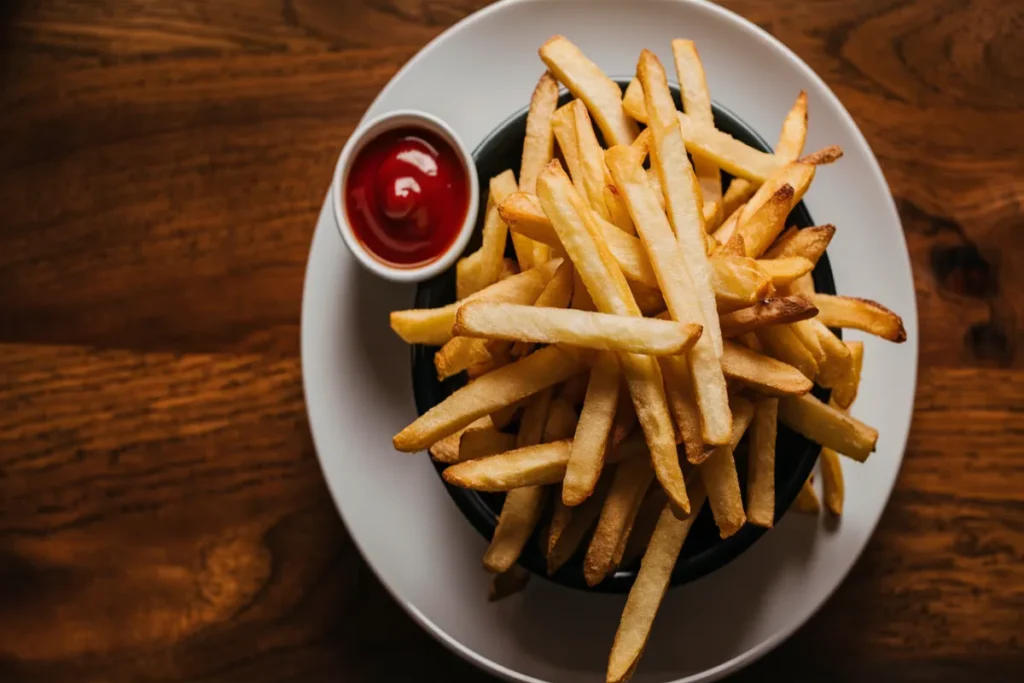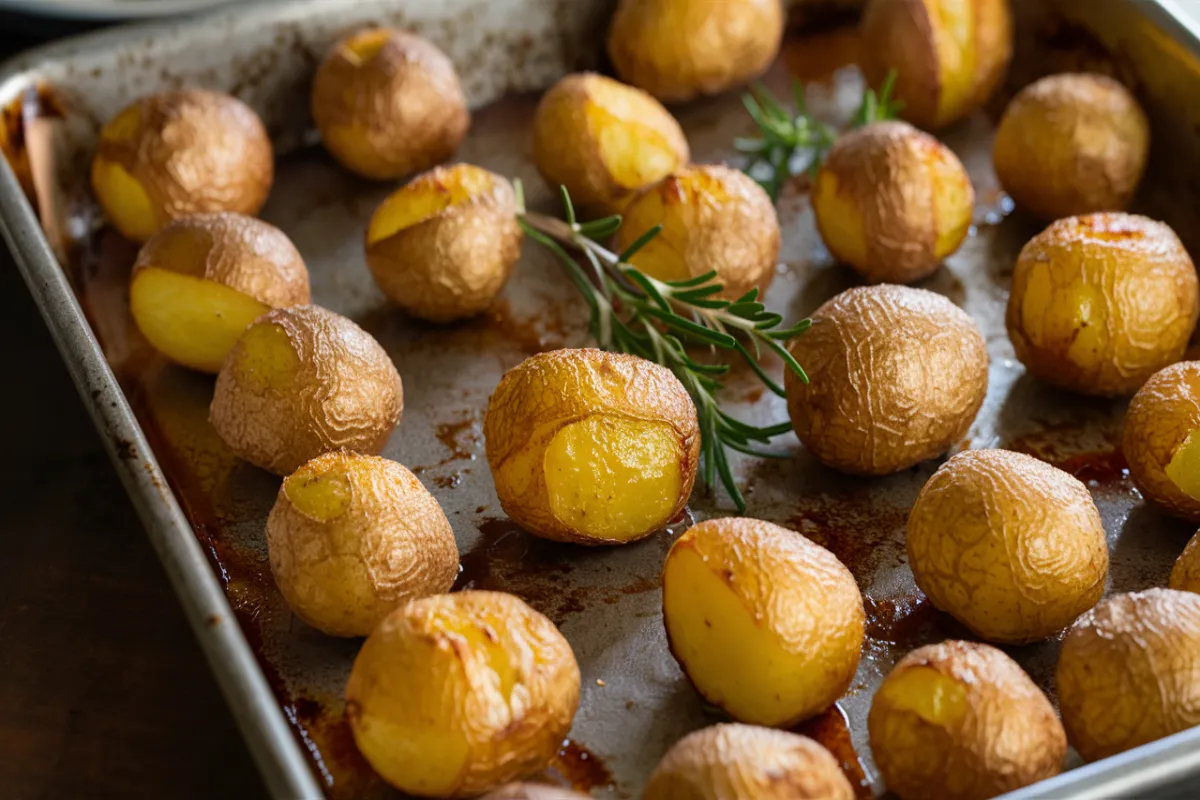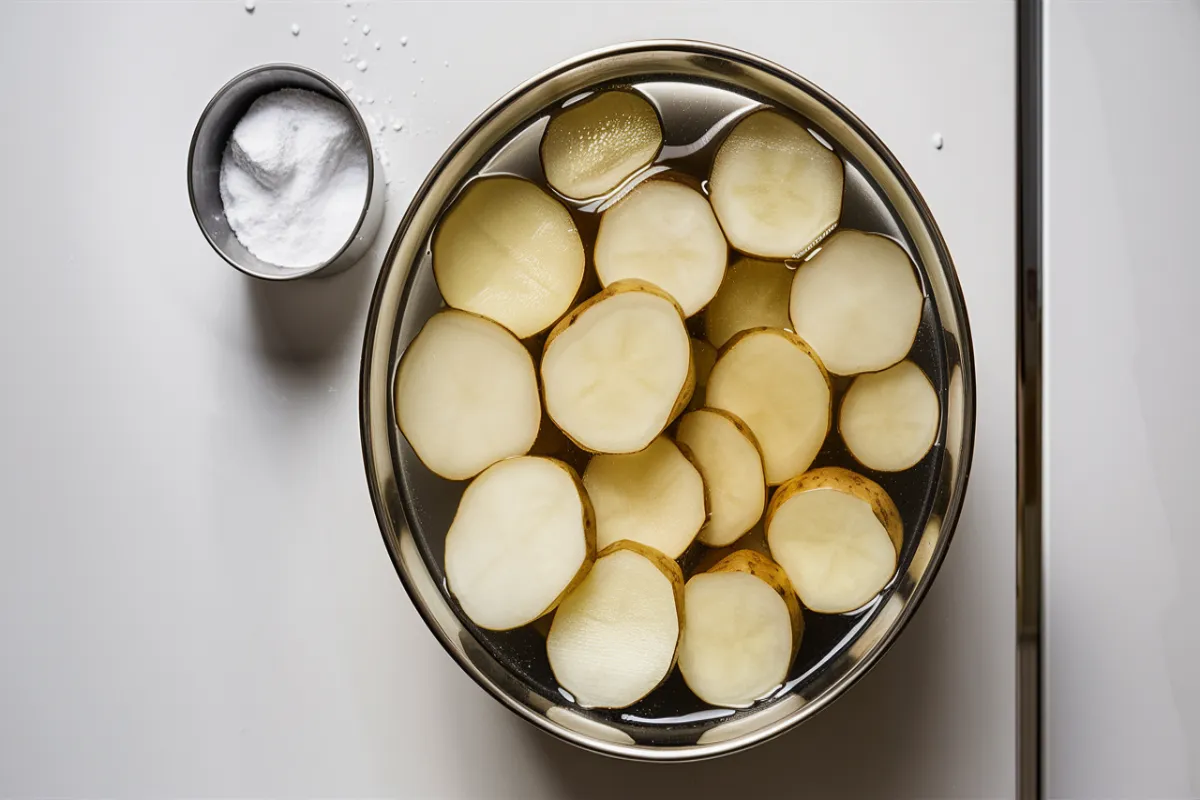Soaking potatoes in baking soda can significantly improve the quality of your potato dishes. This technique enhances texture, flavor, and cooking efficiency, making it a favorite among home cooks. You may wonder, “Why do you soak potatoes in baking soda?” This article will explore the benefits and the science behind this method. By the end, you’ll understand how and why to use this simple yet powerful technique.
1. The Science Behind Soaking Potatoes in Baking Soda
1.1 How Baking Soda Affects Potatoes
When you soak potatoes in baking soda, a chemical reaction occurs. Baking soda, or sodium bicarbonate, creates an alkaline environment. This environment breaks down the natural pectin in the potatoes. As a result, the outer layer of the potatoes softens, making them easier to crisp up during cooking. Understanding this process answers the question: Why do you soak potatoes in baking soda?
1.2 The Role of pH Levels
The pH level of a solution impacts how food cooks. In this case, soaking potatoes in baking soda raises the pH level of the water. The higher pH helps break down the potato’s exterior. This breakdown makes the potatoes cook faster and allows them to brown more evenly. The science behind pH levels further explains why you soak potatoes in baking soda before cooking.
Explore the science driving the future of renewable energy and its impact on the world
1.3 Enhancing Texture Through Soaking
The texture of potatoes improves significantly after soaking in baking soda. The alkaline environment softens the outer layer while keeping the interior firm. This results in a crispy exterior and a fluffy interior. This technique works especially well for fried or roasted potatoes. Therefore, when you ask, “Why do you soak potatoes in baking soda?”—the improved texture is a key reason.
1.4 Faster Cooking with Soaked Potatoes
Soaking potatoes in baking soda also reduces cooking time. The breakdown of the potato’s exterior allows heat to penetrate more easily. This efficiency is particularly useful when cooking large batches of potatoes. The ability to cook potatoes more quickly is another reason why you soak potatoes in baking soda.
2. Benefits of Soaking Potatoes in Baking Soda
2.1 Achieving Perfect Crispiness
One of the main benefits of soaking potatoes in baking soda is achieving perfect crispiness. The softened exterior crisps up beautifully during cooking. This method ensures that your fries, wedges, or roasted potatoes have that desired crunch. This crispy texture is a major reason why you soak potatoes in baking soda before cooking.
2.2 Enhancing Flavor Absorption
Soaking potatoes in baking soda also enhances their ability to absorb flavors. The alkaline environment opens up the potato’s surface, allowing seasonings to penetrate more deeply. This deeper absorption results in more flavorful potatoes. Therefore, better flavor absorption is another key reason why you soak potatoes in baking soda.
2.3 Improving Potato Texture
Texture plays a significant role in the enjoyment of potato dishes. Soaking potatoes in baking soda improves texture by creating a contrast between a crispy exterior and a fluffy interior. This textural balance elevates the overall quality of the dish. Hence, when asked, “Why do you soak potatoes in baking soda?”—improving texture is a compelling answer.
2.4 Reducing Cooking Time
Another benefit of soaking potatoes in baking soda is the reduction in cooking time. The softened exterior allows for faster and more even cooking. This time-saving aspect is particularly useful for busy cooks. The efficiency gained in the kitchen explains why you soak potatoes in baking soda.
3. Practical Applications of Baking Soda Soaking
3.1 Making Crispy French Fries

French fries benefit immensely from soaking potatoes in baking soda. The technique ensures a crispy exterior and a fluffy interior, essential for perfect fries. Soaking the potatoes before frying allows them to cook evenly and develop a golden crust. When it comes to making great fries, soaking potatoes in baking soda is a must.
3.2 Enhancing Roasted Potatoes

Roasted potatoes also benefit from soaking in baking soda. The process helps create a crispy, golden-brown exterior while keeping the inside tender. This method ensures that each piece of potato roasts evenly and develops a satisfying crunch. For perfectly roasted potatoes, soaking potatoes in baking soda is a game-changer.
3.3 Perfecting Potato Wedges
Potato wedges require a balance of crispiness and tenderness. Soaking them in baking soda before baking helps achieve this balance. The process softens the edges, allowing them to crisp up beautifully during cooking. For ideal potato wedges, soaking potatoes in baking soda makes all the difference.
3.4 Optimizing Potato Skins
Potato skins also benefit from soaking in baking soda. The soaking process helps the skins crisp up more effectively while maintaining a soft interior. This method also enhances flavor absorption, making the potato skins more flavorful. For the best potato skins, soaking potatoes in baking soda is a technique you should adopt.
4. How to Soak Potatoes in Baking Soda
4.1 Selecting the Right Potatoes
Choosing the right type of potato is crucial for the best results. Starchy potatoes like Russets work best for this method. Their high starch content allows them to break down more effectively, leading to a crispier exterior. Selecting the right potatoes is the first step in understanding why you soak potatoes in soda.
4.2 Preparing the Baking Soda Solution
To prepare the soaking solution, fill a large bowl with cold water. Add one teaspoon of baking soda per liter of water. Stir until the baking soda dissolves completely. This solution creates the alkaline environment needed for soaking. The correct preparation of the solution is essential when you soak potatoes in baking soda.
4.3 Soaking the Potatoes
Once the solution is ready, add the sliced or cut potatoes to the bowl. Ensure that the potatoes are fully submerged in the solution. Let them soak for at least 30 minutes to an hour. The soaking time allows the baking soda to work its magic. Proper soaking is a crucial step in the process of why you soak potatoes in baking soda.
4.4 Rinsing and Drying the Potatoes
After soaking, drain the potatoes and rinse them under cold water. This step removes any excess baking soda. Then, pat the potatoes dry with a clean towel. Drying the potatoes thoroughly is vital for achieving a crispy exterior. The rinsing and drying steps are final but essential reasons why you soak potatoes in baking soda.
5. Common Mistakes to Avoid When Soaking Potatoes
5.1 Using Too Much Baking Soda
Using too much baking soda can lead to an overly soft exterior or an unpleasant taste. Stick to the recommended amount—one teaspoon per liter of water. This balance ensures that the soaking process works correctly. Avoiding this mistake helps you understand why you soak potatoes in baking soda.
5.2 Soaking for Too Long
Soaking potatoes for too long can result in an overly soft texture. Stick to the recommended soaking time of 30 minutes to an hour. This duration ensures that the potatoes maintain the right balance of tenderness and crispiness. Understanding the correct soaking time is key to knowing why you soak potatoes in baking soda.
5.3 Not Drying the Potatoes Properly
Failing to dry the potatoes thoroughly after soaking can result in a soggy texture. Moisture on the surface prevents the potatoes from crisping up during cooking. Proper drying is crucial for achieving a crispy exterior. This step is another important reason why you soak potatoes in baking soda.
5.4 Skipping the Rinse After Soaking
Skipping the rinse after soaking can result in an unpleasant taste. Rinsing the potatoes removes any excess baking soda, ensuring that the potatoes taste clean. This step is essential for achieving the best flavor. The importance of rinsing highlights another reason why you soak potatoes in baking soda.
6. Frequently Asked Questions About Soaking Potatoes in Baking Soda
6.1 How Long Should I Soak Potatoes in Baking Soda?
The recommended soaking time is 30 minutes to an hour. This timeframe allows the baking soda to break down the exterior without making the potatoes too soft. Proper soaking time is essential for understanding why you soak potatoes in baking soda.
6.2 Can I Soak Potatoes in Baking Soda Overnight?
While soaking overnight is possible, it is not recommended. Extended soaking can lead to overly soft potatoes that do not crisp up well during cooking. Stick to the recommended soaking time for the best results. Understanding the limitations of soaking time helps explain why you soak potatoes in soda for a specific duration.
6.3 What Type of Potatoes Work Best for This Method?
Starchy potatoes, like Russets, are the best choice. Their high starch content allows them to break down more effectively, leading to a crispy exterior and fluffy interior.
6.4 Can I Use Baking Powder Instead of Baking Soda?
Baking powder is not a suitable substitute. Baking soda is an alkaline substance, while baking powder contains additional acids. The alkaline properties of baking soda are crucial for achieving the desired effects on potatoes. This distinction is essential for understanding why you soak potatoes in baking soda and not baking powder.
6.5 Does Soaking Potatoes in Baking Soda Affect the Taste?
Soaking potatoes in baking soda can enhance their flavor by allowing them to absorb seasonings more effectively. However, using too much baking soda or soaking for too long can result in an unpleasant taste. Proper use of baking soda ensures that the potatoes taste delicious. Understanding how to manage flavor is key to knowing why you soak potatoes in baking soda.
Conclusion: The Benefits of Soaking Potatoes in Baking Soda
Soaking potatoes in baking soda is a technique that offers multiple benefits. By breaking down the exterior of the potatoes, this method helps achieve a perfect balance of a crispy outside and a fluffy inside. Additionally, soaking in baking soda enhances flavor absorption and reduces cooking time. This technique answers the question, “Why do you soak potatoes in baking soda?” Whether you’re preparing French fries, roasted potatoes, or any other potato dish, this method ensures they turn out perfectly every time. Understanding the science and benefits behind this technique empowers you to use it effectively in your kitchen. So, next time you’re cooking potatoes, remember to soak for the best results.

